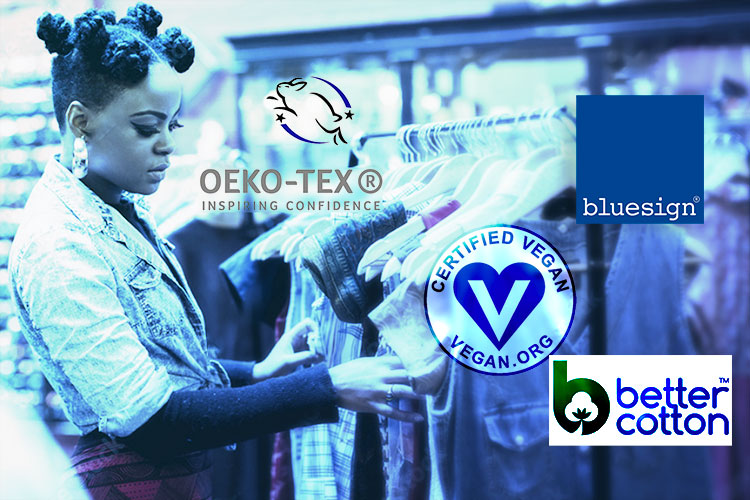
Editor’s Note: Like many people who shop responsibly, I’ve long been a fan of B Corps. And why not? The definition of a B Corp by B Lab, the non-profit who does the certifying is this:
Certified B Corporations are businesses that meet the highest standards of verified social and environmental performance, public transparency, and legal accountability to balance profit and purpose. B Corps are accelerating a global culture shift to redefine success in business and build a more inclusive and sustainable economy.
In fact, we were preparing to publish a list of our favorite B corps. –Even though there were some that I questioned. For example, Athleta. It’s owned by Gap and has no issues overproducing loads of synthetic products that aren’t recyclable. Yet it is listed as a B Corp. So when I saw on our IG feed that Carly Burson, the founder of the truly responsible brand LAUDE the Label was walking away from B Corp certification I wanted to read why –and then I wanted to share it with you.
Below is Carly’s article which can also be found on their site. And look for our interview with her about this and LAUDE the Label soon!
The Controversy Surrounding B Corp Certification
–by Carly Burson
B Corp certification, a designation that once stood for ethical and socially responsible businesses, has recently come under intense scrutiny and controversy. What began as a noble initiative aimed at promoting corporate responsibility and sustainability has been mired by criticisms, issues with certified brands that fall short of the standards, and growing skepticism among stakeholders. In this article, we will delve into the myriad of criticisms leveled against B Corp certification, explore cases where certified brands failed to meet their purported standards, and examine the reasons behind the diminishing trust in B Corp as an organization.
Like us at LAUDE, numerous smaller companies that were early supporters of these standards have expressed concerns about what they see as a growing emphasis to certify large multinational corporations, who may only address one area of sustainability, rather than focusing on improvements within their entire supply chain.
A petition, supported by brands as prominent as Dr. Bronner’s has been making the rounds within the B Corp community, calling for B Lab to reconsider its standards, which many view to be lax and subjective. LAUDE’s founder, Carly Burson, also raises questions about how a company like Patagonia can attain a significantly higher score than smaller to medium-sized brands, especially when they do not commit to ensuring living wages throughout their entire supply chain. She comments, “If multi-billion dollar companies aren’t even ensuring fair, livable wages for their suppliers, then we’re setting the bar remarkably low.”
As a company, Patagonia commits to an annual analysis of living wages across their apparel-assembly supply chain and reported that in 2021, 33 percent, or 10 out of their 33 apparel-assembly factories, are paying a living wage, on average. Unfortunately, their internal living wage analysis has not been updated since 2021.
Burson also adds, “It’s incredibly frustrating to build a brand that considers all aspects of our supply chain, and the ways in which every decision impacts people and planet, to witness a horrendous company like Nespresso receive the same score. Once that happened, I knew the essence of B Lab was lost, and that I could no longer ask our customers and partners to trust what I viewed to be an empty stamp of approval.”
In the Financial Times article, The Struggle for the Soul of the B Corp Movement, Erinch Sahan, formerly the Chief Executive of the World Fair Trade Organization remarks, “Becoming a B Corp is exceedingly accessible to any company. This accessibility is its primary asset but is also its principal drawback, as it doesn’t mandate the substantial changes in business practices that are urgently needed.” He also adds, “One thing they excel at is creating a community of business professionals fervently committed to sustainability. Yet, when you announce your B Corp status, people naturally expect that you genuinely prioritize both people and the planet. However, that isn’t necessarily the reality.”
B Corp Certification: A Brief Overview
B Corp certification, is a designation awarded to businesses that meet certain social and environmental performance standards. This certification was introduced as a way to recognize and incentivize companies to consider not only profits but also their impact on people and the planet. To earn the certification, businesses must undergo a rigorous assessment that evaluates their governance, environmental practices, social impact, and transparency.
The B Corp certification has been hailed as a groundbreaking movement to promote conscious capitalism, aiming to redefine success in business by not just looking at the bottom line, but also considering the welfare of employees, communities, and the environment. However, it’s this very aspiration that has come under scrutiny, leading to growing controversy around B Corp certification.
Criticisms of B Corp Certification
- Greenwashing Accusations
One of the most significant criticisms directed at B Corp certification is the alleged prevalence of greenwashing. Greenwashing is the deceptive practice of conveying a false impression of a company’s environmental responsibility. Critics argue that some B Corp-certified companies use the certification to mask their unsustainable practices. These companies may tout their B Corp status while continuing to engage in environmentally harmful activities. This raises questions about the effectiveness of the certification in genuinely identifying and promoting ethical and sustainable businesses.
- Relatively Low Bar
B Corp certification sets a specific threshold that businesses must meet, but some critics argue that the bar is set too low. They believe that the certification criteria do not rigorously ensure that a company is truly ethical and sustainable. For instance, a company can be certified as a B Corp even if it fails to pay a living wage to its employees or engages in unsustainable practices, as long as it meets the minimum score in other areas. This criticism undermines the credibility of B Corp certification and questions its commitment to promoting genuine corporate responsibility and change across all aspects of the business.
- Subjectivity and Lack of Transparency
The B Corp assessment process relies on self-reporting, which makes it susceptible to manipulation and misrepresentation. Critics argue that this lack of transparency and objectivity in the evaluation process can lead to businesses obtaining B Corp certification without actually meeting the intended standards. Furthermore, some critics have questioned the influence of corporate interests in shaping the certification criteria and maintaining a subjective evaluation process.
- Dilution of Values
Another criticism stems from concerns that the growing number of B Corp-certified businesses dilutes the impact of the certification. As more companies obtain the B Corp label, some argue that it loses its significance as a marker of true corporate responsibility. This dilution can diminish the incentive for businesses to genuinely improve their practices to meet the certification standards, as they may simply see it as a marketing tool rather than a commitment to a broader purpose.
- Inadequate Accountability
Critics have also pointed out that B Corp certification lacks an effective mechanism for holding certified companies accountable. While the certification process itself assesses a company’s performance, it is unclear what happens when a B Corp-certified company falls short of the standards. Some argue that the lack of meaningful consequences for non-compliance undermines the credibility of the certification.
Cases of B Corp Brands Falling Short
The controversy surrounding B Corp certification isn’t solely based on theoretical criticisms; there have been real-world examples of certified companies failing to uphold the values associated with the designation. These cases have contributed to the erosion of trust in B Corp as an organization. Criticisms span across companies such as Patagonia, Danone North America, and Ben & Jerry’s, but more recently, the controversy surrounding Nespresso’s B Corp Certification have taken center stage.
The Controversy Surrounding Nespresso’s B Corp Certification
Nespresso, a subsidiary of Nestlé Group, is a well-known coffee brand that has been a source of controversy regarding its B Corp certification. The brand achieved its B Corp certification in 2019, a move that generated mixed reactions and fueled the ongoing debate about the effectiveness of B Corp certification.
- Labor and Supply Chain Practices
Critics have raised concerns about Nespresso’s labor and supply chain practices. They argue that Nespresso has faced allegations of exploiting coffee farmers in developing countries, where coffee is sourced. Accusations of low wages, poor working conditions, and a lack of transparency in sourcing have called into question whether Nespresso’s practices align with the B Corp values of social responsibility.
- Environmental Impact
While Nespresso has made efforts to promote sustainability through its coffee capsules and recycling programs, some critics question the brand’s true commitment to reducing its environmental footprint. Concerns have been raised about the sustainability of single-use coffee capsules and the carbon emissions associated with their production and disposal. These issues have led to skepticism regarding Nespresso’s B Corp certification, which is intended to promote environmentally responsible practices.
- Ownership and Corporate Influence
Nestlé Group, the parent company of Nespresso, has faced its own share of controversies, including allegations of unethical marketing and environmental practices. Critics argue that the ownership by a multinational corporation with a complex track record raises questions about the influence of Nestlé Group on Nespresso’s B Corp certification. The connection between a B Corp-certified subsidiary and a larger, non-certified parent company has fueled doubts about the authenticity of the certification.
This leads to a Diminishing Trust in B Corp
The aforementioned criticisms and instances of B Corp-certified companies falling short of the standards have led to a growing sense of distrust in the B Corp organization. Several factors contribute to this erosion of trust:
- Perceived Lack of Enforcement
The absence of strict enforcement and meaningful consequences for companies that fail to meet the certification standards has contributed to the perception that B Corp certification is more of a marketing tool than a genuine commitment to ethical and sustainable practices. This has made stakeholders, including consumers and investors, question the credibility of the certification.
- Proliferation of Certifications
The rise of various sustainability and ethical certifications has made it difficult for consumers and investors to differentiate between them. With many businesses holding multiple certifications, the significance of B Corp certification becomes diluted, further eroding trust in its effectiveness as a standard for ethical and responsible business practices.
- Corporate Influence
Critics have raised concerns about the influence of corporate interests within the B Corp organization, potentially compromising its ability to maintain a rigorous certification process. The perception that B Corp may be swayed by corporate stakeholders rather than acting solely in the interest of the broader social and environmental goals has contributed to the loss of trust.
- Greenwashing and Misrepresentation
The persistence of greenwashing and misrepresentation by some B Corp-certified companies raises questions about the certification’s effectiveness in evaluating and promoting corporate responsibility. When consumers and investors come across companies that misuse or abuse the certification, it erodes trust in the B Corp label as a reliable indicator of genuine ethical and sustainable practices.
B Corp certification, once seen as a beacon of ethical and sustainable business practices, has become the center of controversy. Critics argue that the certification’s criteria are too lenient, the evaluation process is subjective, and the organization lacks effective accountability mechanisms. Real-world cases of B Corp-certified companies falling short of their purported standards have further contributed to the erosion of trust in the organization. As B Corp certification faces criticism and scrutiny, it must adapt and evolve to address these concerns, regain trust, and continue to promote the ideals of ethical and sustainable business practices that it was founded upon.
LAUDE’s founder, Carly Burson recently made the decision to not seek re-certification through B Lab, publicly announcing the brands decision to walk away from the B list. In a recent Instagram post Burson states, “As a brand committed to ethics and sustainability, I have made the decision that LAUDE will be parting ways with B Corp, choosing not to re-certify due to the controversy shrouding the organization. B Corp controversies and issues with certifying truly problematic brands have eroded my trust, necessitating a reevaluation of LAUDE’s re-certification choices. We remain steadfast in our commitment to social and environmental responsibility, and this decision merely reflects a deeper commitment to transparency and accountability. It’s been years since I’ve believed in their lax standard, and if I don’t trust them, I can’t ask you to.”
LAUDE maintains its commitment to its verification by the Fair Trade Federation (FTF) and participation in the Social Enterprise World Forum, as these organizations share a profound alignment of values with LAUDE.
“I’m dedicated to partnering with organizations that strive to drive substantial change within deeply unethical capitalist structures, rather than those that merely improve the image of problematic actors,” Burson emphasizes. She further adds, “Numerous remarkable small businesses have achieved B Corp certification, and I encourage individuals to conduct their research to support genuine social enterprises. While it was once B Corp’s role, regrettably, I no longer believe we can rely on them to be the gold standard.”
Related Articles






